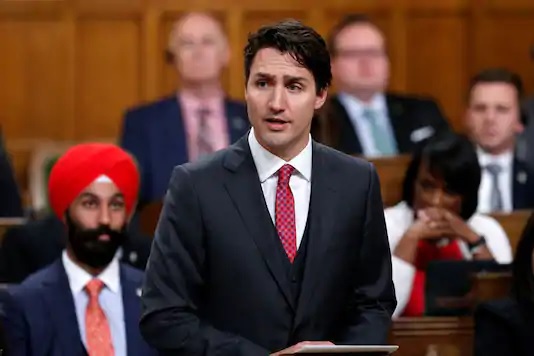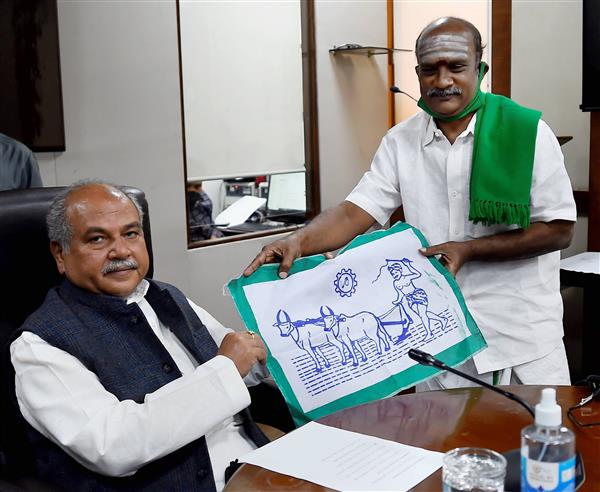
Summary: Changes in agricultural policy in India has not gone well with some vested interests in the agriculture industry. It is in this new policy that the farmers are given an opportunity to sell their crops more freely than ever before. What are the farmers opposed to then and why are countries like Canada extending their support?
The Punjabi lobby has grown very powerful in Canada leaving behind all other immigrants. There are 18 Sikhs in Canada’s parliament. When Prime Minister Justin Trudeau did not get the full majority, New Democratic Party leader Jameet Singh backed him with his 18 MPs. Hence, the Prime minister of Canada is not in a position of speak against the Sikh lobby. In order to retain power, he will have to dance to the tunes of this lobby.
Many policies have changed since 2014 which have shook the very foundation that was built by vested interests for over 6 decades. It is but obvious to be shocked and show their non-cooperation. Protesting over unfounded allegations is just one of the many ways that has been brought about.
A demonstration to express solidarity with protesting Indian farmers by countries like Canada and England is a testament to how much the world has changed today. People sitting in the west are preparing a blueprint of things happening here and are arranging for its execution in whatever capacity required, including but not confined to funds alone. Looking back at our history it is evident that whenever a foreign invasion has taken place, it has always been aided by an insider. The loopholes in the system have been passed on to our enemies in exchange for a few bucks. That it was indeed a cakewalk for them to take control over us, is but an open secret which is very disappointing.
To lure the men within to join hands with the forces outside isn’t new to us. With pride, we can say that we haven’t really learned anything from history! We are yet again witnessing and perhaps will be a testimony of one such event – the agricultural reforms of 2020.
Unfounded Criticism

Changes in agricultural policy in India has not gone well with some vested interests in the agriculture industry. It is in this new policy that the farmers are allowed to sell their crops more freely than ever before. This provides the possibility for agriculture to grow like any other field in modern India. With this in place, it is but natural to raise a question, what are the farmers opposed to then? Note that the government does not set minimum support for farmers; hence this would leave the farmers at the mercy of the corporate, so large business houses are more likely to swing in and exploit small farmers. The farmers will not be able to fight against them as they do not have the necessary sources is the contention of the protesters. To be able to draw a logical conclusion we should first review the present condition.
Note that the existing agricultural policy does not benefit the small and very small farmers; it benefits the large and very large farmers only. Had this policy not changed, would it then help the small and medium farmers? Well, the answer would still be NO. Thus today the real farmer is not on the street since he is well aware no matter whoever is at the helm it wouldn’t help him in any way if the existing laws continue.
Let us take a small example of what happens under the new rule. Suppose a man named Ramanna wants to grow vegetables on his 3-acre land and Reliance Fresh comes to him and makes a deal to buy all the vegetables that will be grown in the next one year. Here Ramanna accepts their pricing only after which an agreement will be signed. It is to be noted that Reliance cannot enter his farm, should he decide not to sell his produce. Reliance can only restrain Ramanna from selling his produce elsewhere to anyone outside his farm. This does not mean giving up on the interest of the farmer. What happens in practice? Can a farmer with 3-acre land stand against corporate giants? This is the concern being expressed by the protesters.
Let us assume the opposition is correct. Had this policy not changed, would it still be beneficial to the small farmers? The answer will still be a NO. There hasn’t been any change to the life or lifestyle of farmers. Agricultural markets are the niche of brokers. Large farmers are still able to somehow get the money they want. However, is there no one to heed to the cry of the smaller ones?
50-60% of India’s population depends on agriculture for their daily requirement. Perhaps, there isn’t any need to specially mention that most of them are small-time farmers. It can be noted that none of these farmers are on the streets opposing the agrarian policy. The whole agenda has now shifted politically. It has been so colorfully presented that Canada and England are now playing the role in the so-called peasant protest in India. It is a curious case of paradigm shift. Let us learn about the secret behind their involvement.
Secret behind Canada’s Involvement

The number of Sikhs in Canada is about 2% of the entire population. It is insignificant in terms of number but their lobbying capacity is so high that it ranks 3rd just next to English and French. Canada’s election policy is one of the main reasons why the Punjabi lobby has grown so powerful leaving behind all the immigrants from different parts of the world. If nominated by any party, the candidate must obtain a minimum number of signatures. Of course, the cohesion among the Punjabis has made them strong in the political arena.
In the city of Woodstock, 100km from the city of Toronto 80% of the residence are Sikhs. This gives us a fair idea of their dominance. Thus there are 18 Sikh members in Canada’s parliament. Prime Minister Justin Trudeau did not get a full majority. New Democratic Party leader Jameet Singh has backed Justin with his 18 MPs. Born into a Punjabi immigrant family in Ontario in 1979, Jameet became a kingmaker.
This is how the people who emigrated 40-50 years ago are extremely well settled. In a country like Canada, it is natural for people who have a high profile to extend their power in their own land. Though this is not going to be easy in India. However, what if Punjab is separated from India or if Khalistan comes into existence? The Prime Minister of Canada is not in a position to speak in front of the Sikh lobby. In order to retain power, they will have to dance to the tunes of the Sikh lobby.
In England too, the number of immigrants has exceeded the number of natives in many cities. Pakistani Muslims and Sikhs are plenty in number. The binding factor of these two communities is the language. Punjabi is the mother tongue of most Pakistanis in Britain and other parts of Europe. British Sikh MP Tan Desi has expressed his support for the protests by farmers in India, especially in Punjab, and has been successful in getting the signature of 35 other MPs and has presented the same in the UK parliament.
The fact is that less than 5 % of MPs in Canada or England have shown their support for this movement. Further, these countries without offering any resistance have agreed upon the WTO (World Trade Organization) rule on the removal of subsidies on agriculture. India too has come forward to treat agriculture on par with other fields as has been declared by the Commerce Ministry. Canada is in a fix now and India has been successful in showing the dual nature of Canada.
The inner forces that conspire and the conspirators have both lost power and money here in India. They have a great deal of re-identification to do. Many policies have changed since 2014 which have shaken the very foundation that was built by vested interests for over 6 decades. It is but obvious to be shocked and show their non-cooperation. Protesting is just one of the many ways that have been brought about.
In conclusion, the central government should be advocating on behalf of small and very small farmers. It should make simple and all-encompassing changes to avoid any exploitation of farmers. It has come to the knowledge that this protest has taken a political turn as everyone wants to make hay when the sun shines. If the policy provisions accurate pricing in support of small farmers assuring their security, then such protests wouldn’t last for more than an hour. This policy looks good on paper. The catch however is to implement the same as effectively as it is written.
(Author is an expert advisor on finance and an economic analyst. He has traveled in over 60 countries and has published many books on finance and travel. He is a regular contributor to many reputed weeklies and dailies.)
(Disclaimer: The views expressed are those of the author and do not necessarily reflect the official views or position of SamvadaWorld)
